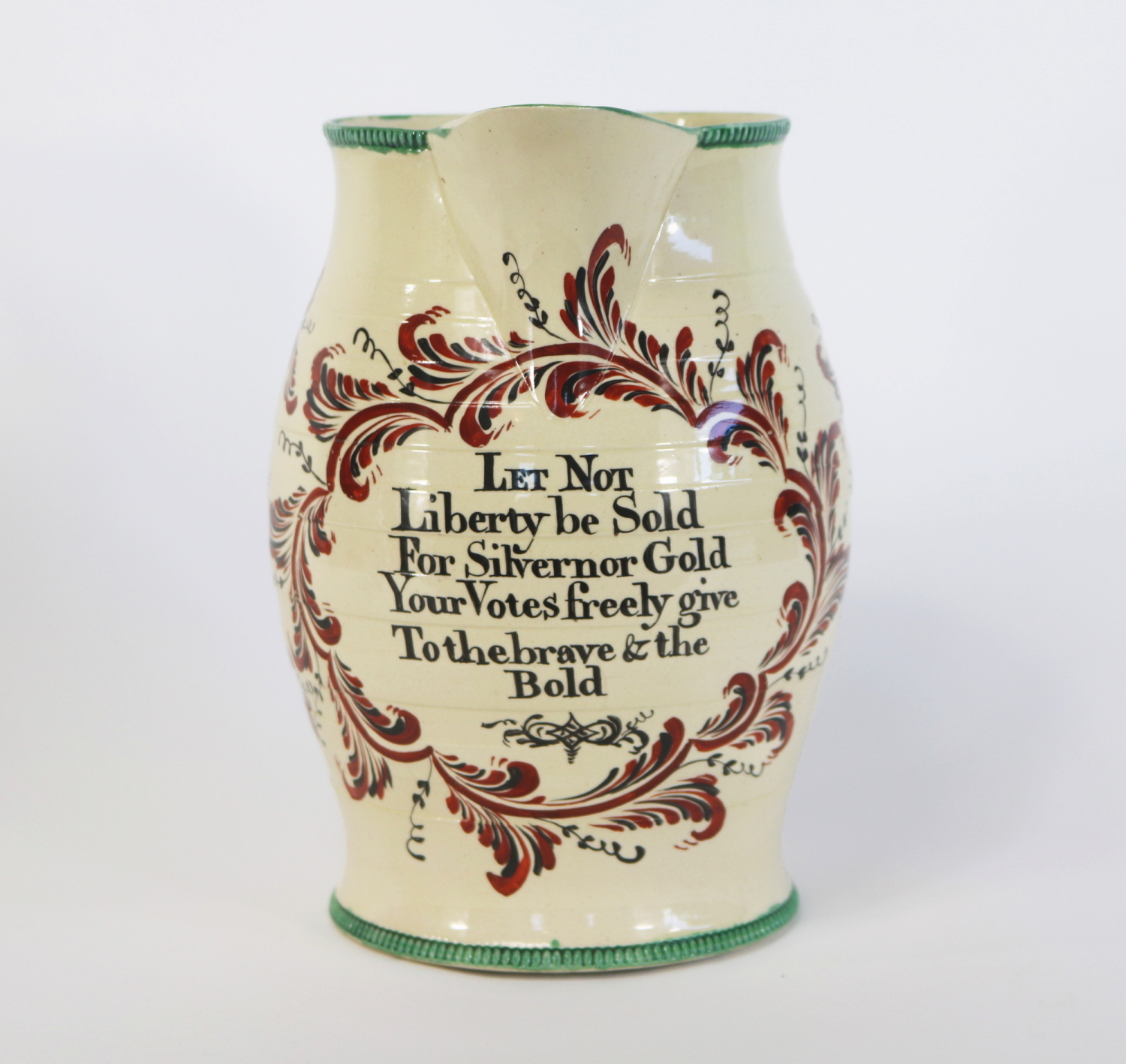
| |
EXTRAORDINARY, PRE-REVOULTIONARY WAR, ENGLISH CREAMWARE JUG WITH JOHN WILKES PATRIOTIC VERSE, ATTRIBUTED TO THE LEEDS POTTERY, MADE FOR THE AMERICAN MARKET |
| |
|
| Dimensions (inches): |
8.25" x 4.75" |
| Description: |
|
Pre-Revolutionary War, Stamp-Act era, English creamware pitcher, with polychrome painted decoration that includes the following, pro-American, patriotic verse:
Let Not
Liberty be Sold
For Silver nor Gold
Your Votes freely give
To the brave & the
Bold
Attributed to the Leeds Pottery in Hunslet, just south of Leeds, England, this 8.25-inch tall x 4.25” diameter, turned jug, has incised banding, an applied lip, and an elaborate, applied, braided and reeded, strap handle. The latter is punctuated at the points of attachment with applied, floral decoration, painted in green, yellow, and violet. The same green—which became a staple of the Leeds company—is repeated in the oval, beaded decoration, along the top and bottom edges.
The verse—a product of the popular, outspoken, and controversial British statesman, John Wilkes—is one of several known, patriotic, American maxims or messages, that adorn the works of the Leeds and other makers of ceramics in the late colonial era. Teapots and mugs, and presumably other vessels, were made for sale to the American market soon after the 1766 repeal of the hated Stamp Act. The capacity of British makers was growing rapidly, easily outpacing American firms that attempted to compete at the same level. Because production was growing too fast for demand, makers of British ceramics sought to create a market, bravely applying decoration that appealed to the American distaste for British rule. Leeds was just one of the participants. The most notable of the various forms, produced by more than one maker, featured the words “No Stamp Act” or “Stamp Act Repeal’d.” Several examples survive with the same or very similar red color that appears on the Wilkes jug (ref. Colonial Williamsburg, Smithsonian Museum of American History, Peabody Essex Museum).
Both teapots and mugs were produced that feature the phrase: “Wilkes & Liberty” on one side, and the number “45” on the reverse. The latter referred to an issue of a Magazine that Wilkes published, in which he criticized King George for the 1763 Treaty of Paris, that ended the Seven Years War (with France, Spain, and others). This was not American-specific, but the sentiment certainly was. Wilkes was imprisoned temporarily, but dodged execution and was released, on the grounds that he was merely reporting statements made by him before Parliament, and protected by Parliamentary privilege. Soon after he became Lord Mayor of London. Most Englishmen understood the American position, even if they neither desired nor dared to actively support it. And the fact that such ceramics were being produced in the first place, to celebrate the repeal of an act of the British government, speaks volumes about the importance of trade with colonial America to British industry.
On the jug in question here, the foliated decoration surrounding Wilkes’ words is applied in tomato red and black. Examples of both Wilkes-related teapots and mugs survive with the same colors. In fact, one or both of these colors are almost universal on ceramics with anti-King George III decoration, made for the American market in the period immediately preceding the Revolution.
The decoration on the side of the jug features the words: “God Speed the Plough,” accompanied by an illustration of the device, while the reverse depicts of a sheaf of wheat, with the phrase: “Success to the Grain Return’d”. While these can both be found on other English ceramics of the period, made for the English market, they were a natural fit for America. The same color pallet and a plough appear on a teapot that bears the message: “Prosperity to the Province of Pennsylvania.”
A mug bearing the same “Let Not Liberty be Sold…” verbiage, was exhibited by the Bethnal Green Branch of the Victoria and Albert Museum, in South Kensington, U.K., as part of a collection lent by Henry Willet, Esq., and is recorded in a corresponding catalogue, printed in 1899, in London, by the Department of Science and Art of the Committee of Council on Education, “For Her Majesty’s Stationary Office.” In it, the cataloguer attributes the mug to Leeds, with a date of 1764.
In my research I found no other surviving jugs of any sort, only teapots and mugs, or straight-sided cups that appeared to have no handles.*
* It is of interest to note that Chinese Export porcelain also survives with Wilkes’ name, image, and the word “Liberty,” made for the American market, closely on the heels of the British examples.
Condition: Expert restoration to several cracks in the body and spout, emanating from the top downward and varying from 2 – 4 inches in length, as well as to small chips in the spout, and re-glued breaks in the vessel, and to fill where a tiny piece was absent. Remarkably, the delicate strap handle was completely intact, save a tiny fleck, and the base, undamaged. As the only known example within a small and group of delicate, Patriotic, American-themed ceramics of the pre-Rev War era, the state of preservation is both understandable and warranted. Further, the restoration was so exceptionally well done, and of such remarkable quality, that it cannot be visually detected. |
|
|
| |
|
| Primary Color: |
ivory, tomato red, green |
|
| Earliest Date: |
1763 |
|
| Latest Date: |
1773 |
|
| For Sale Status: |
Sold |
|
| Price |
SOLD |
|
| E-mail: |
info@jeffbridgman.com |
|
 |
|
Page Views:... 1822 |
|


